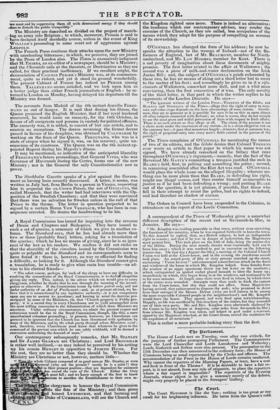A Royal Commission has issued for inquiring into the revenue
of Deans and Chapters and Bishoprics. They have issued to each a set of queries, a summary of which we give in another co- lumn. The Standard says, that he has had already more than two or three [probably four] letters; asking for a translation of the queries ; which he has no means of giving, since he is as igno- rant of the key as his readers. We confess it did not strike us that the obscurity of the circulars issued by the Commission was quite so palpable as the Standard and its correspondents seem to have found it : there is, however, no way so effectual for finding a difficulty, as looking for it. Although the Standard cannot give a translation, he is ready to give what costs less trouble—an ad- vice to his clerical friends- " The safest course, perhaps, for 'such of the clergy as have any difficulty in resolving the conundrums of the Royal Commissioners, is to declin# altogether giving any reply. This, indeed, is the advice which we would give to every clergyman, whether he thinks that be sees through the meaning of the investi- gation or otherwise. If the Commission issues by letters patent only, and not under authority of an Act of Parliament—and, as at present advised, we be- lieve that it is unsanctioned by any legislative authority—it is not compulsory upon any one to answer its questions ; and bearing in mind the doctrine pro- mulgated by some of the Ministers, viz. that Church property is Public pro- perty,' it is a sacred duty in every Churchman not to yield uncompelled even the most trifling concession to the Administration of which these Ministers are members. Under ordinary circumstances, we admit the greatest respect and submission would be due to the Royal Commission, though, like this, a mere unauthorized volunteer proceeding; at present, however, no Churchman can pretend to be ignorant that the Church has been threatened with spoliation by some of the Ministers, and by the whole party through whom Ministers exist ; and, therefore, every Churchman Must know that whatever be gives to the command of the present men which he can safely withhold, will be deemed a concession authorizing the demand of more."
Our contemporary subsequently remarks, that Mr. STANLEY and Sir JAMES GRAHAM are Christians ; and Lord BROUGHAM IS rather well inclined,—as may indeed be perceived by his setting up his cousin HENLEY in opposition to JOSEPH HUME. For the rest, they are no better than they should be. Whether the Ministry are Christians or not, however, matters little— "W- • e whole Cabinet composed of as good men as Mr. Stanley, or even erceval [why not the present? surely he is a saint?] they in their present position—they are dependent for existence as vowed the ruin of the Church. Either the Grey h must fall ; and we 'know enough of the first to know esitate to sacrifice the Establishment to their own se- e clergymen to honour the Royal Commission ttle the fate of the Ministry; and then pious Xpd honest LYNDHURST, and that burning and e Duke of CUMBERLAND, will see the Church and the Kingdom righted once more. There is indeed an alternative: the insolence which our contemporary advises, may render the enemies of the Church, as they are called, less scrupulous of the means which they adopt for the purpose of compelling an account of its stewardship.


























 Previous page
Previous page